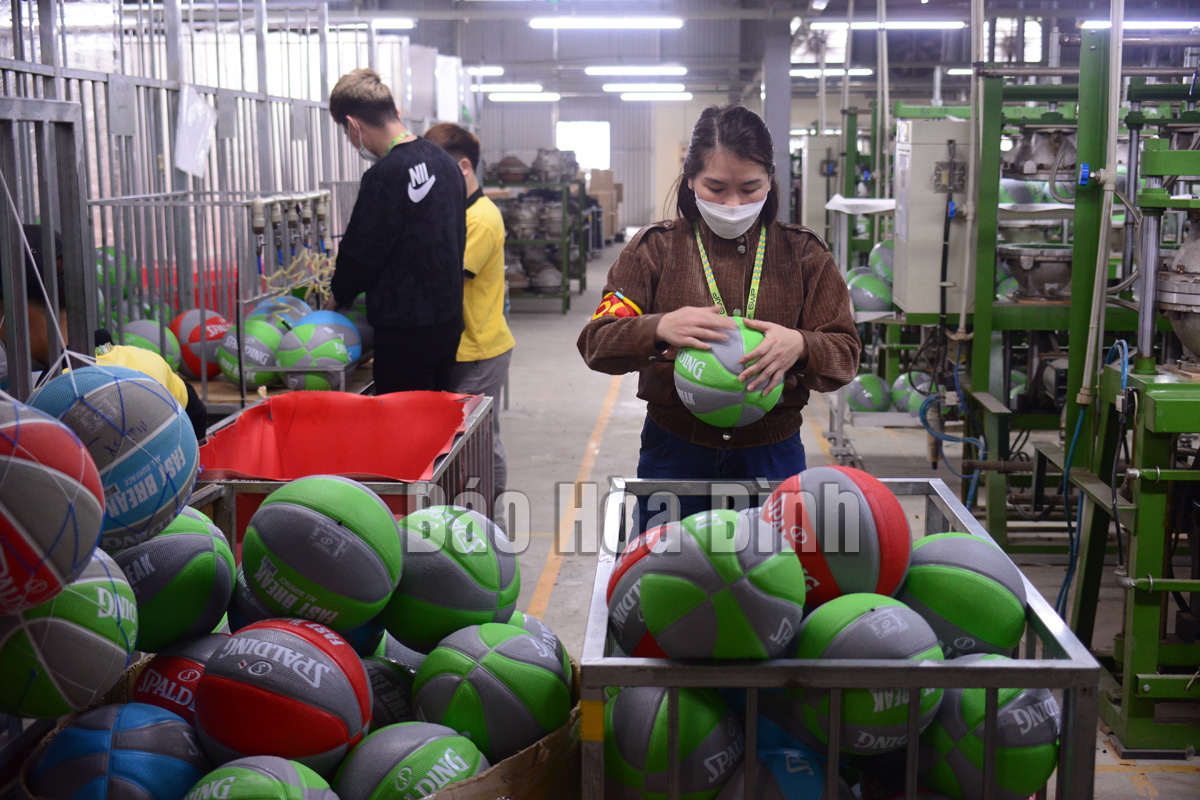
(HBO) – Over the last two years, the COVID-19 pandemic has made the lives of people and workers in Hoa Binh, like elsewhere, more difficult. Local authorities have initiated various support activities to the benefit of needy workers and impoverished people, helping them overcome hardships.
Hoa Binh province takes effective measures to help enterprises maintain production in the "new normal.” Production at Global Sports Co., Ltd. at Mong Hoa Industrial Park in Hoa Binh city.
Bui Tien Luc, Chairman of the provincial Fatherland Front Committee, said on the occasion of the Tet (Lunar New Year) holiday, the province delivered nearly 24,000 gift packages totaling 5.96 billion VND to those who rendered great services to the nation; and provided 13.6 billion VND worth of aid to poor households.
Local departments and units have strictly enforced the provincial People Committee’s Plan 208/KH-UBND dated November 8, 2021, on safe and flexible adaptation to and effective control of COVID-19 to not only protect people’s wellbeing but also boost socio-economic recovery. Over 5.15 billion VND has been provided to 11 companies to help them pay salaries for a total of 1,548 workers while nearly 41,200 workers have been entitled to a reduction of premiums for occupational accident and disease insurances.
They also have accelerated communication campaigns to raise public awareness of the government’s policy credit scheme for employers and workers affected by the COVID-19 pandemic. Soft loans will be provided to support the creation of jobs, purchase and lease of social housing apartments for factory workers, and house repair and construction.
The province has also drastically resolved challenges facing tax payers, through payment deferral of corporate, personal income, value-added, special consumption and land taxes last year. It has slashed land lease fees and corporate income tax by 30 percent for pandemic-hit enterprises.
These form part of the province’s efforts to fulfill a consistent goal of improving and enhancing the people's living standards, increasing social welfare, social security and leaving no one behind./.
The Standing Board of the Hoa Binh provincial Party Committee has agreed in principle on a proposal by the Standing Board of the Party Committee of Hoa Binh city to gather feedback on the city’s 1:2000 zoning plan, which forms part of its broader urban development strategy.
Hoa Binh province has made notable progress in public administration reform and digital government development, with the satisfaction index among citizens and businesses reaching over 84%, according to recent government evaluations.
Thanks to great efforts by local authorities in recent times, the governance and public administration performance of Mai Chau district has been significantly improved.
In the afternoon of June 6, the Party Committee, the People's Council, the People's Committee and the Fatherland Front of Lac Son district solemnly held a meeting to celebrate the 139th anniversary of the district's founding (1886–2025) and the 79th anniversary of the establishment of the district's Party Committee (1946–2025). There was the attendance of Mr. Bui Van Thang, the Vice Chairman of the Provincial People's Council; Mr. Quach Tat Liem, the Vice Chairman of the Provincial People's Committee; Ms. Dang Bich Ngoc, the Deputy Head of the National Assembly Delegation of the province; as well as the former leaders of the province and district through various periods, who are the natives of the district.
Implementing the Politburo’s Resolution No. 57-NQ/TW on breakthroughs in science – technology, innovation, and digital transformation is a golden opportunity for the northern mountainous province of Hoa Binh to renew growth model, improve competitive edge and shorten digital gap.
Resolution 57-NQ/TW, issued by the Politburo on December 22, 2024, identifies sci-tech, innovation, and digital transformation as strategic breakthroughs to build a developed and prosperous nation. In Hoa Binh province, this spirit is not just a slogan, it’s being put into action through concrete initiatives that form a "new development triangle”: digital citizenship, digital economy, and digital administration.



